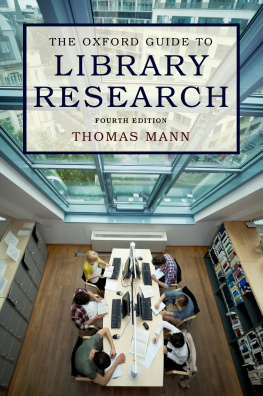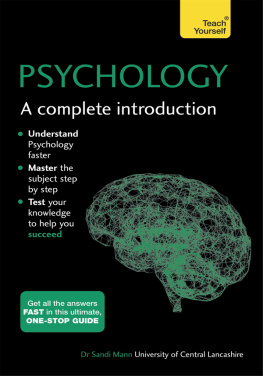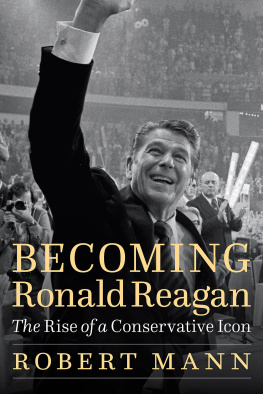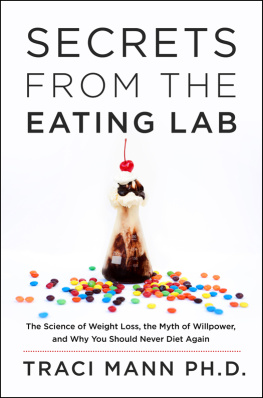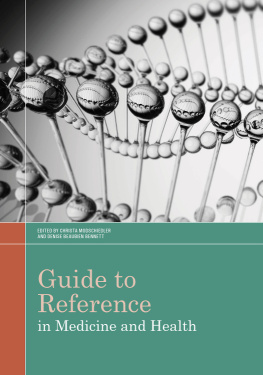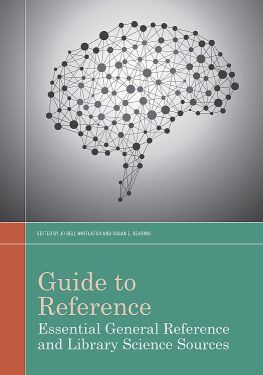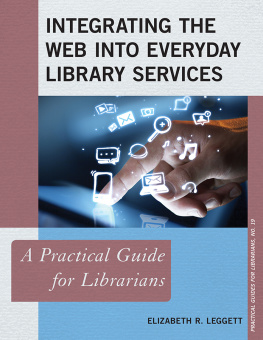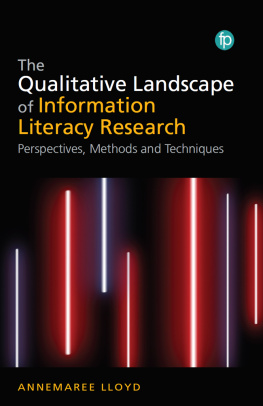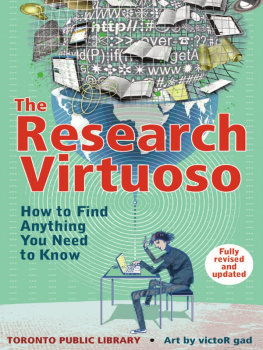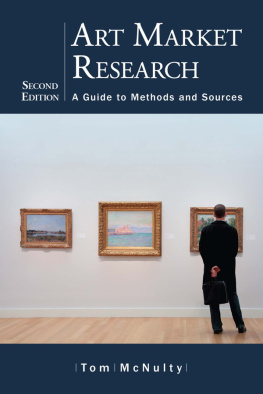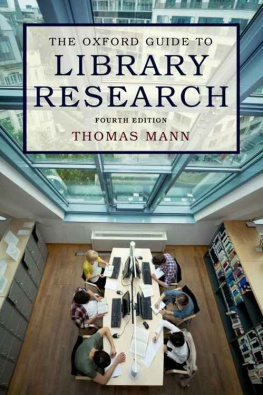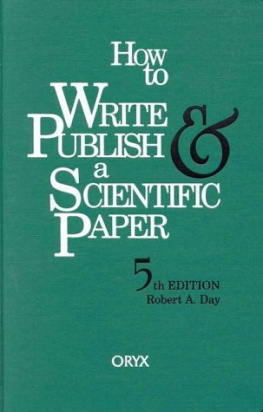The Oxford Guide to Library Research

Oxford University Press is a department of the University of Oxford. It furthers the Universitys objective of excellence in research, scholarship, and education by publishing worldwide.
Oxford New York Auckland Cape Town Dar es Salaam Hong Kong Karachi Kuala Lumpur Madrid Melbourne Mexico City Nairobi New Delhi Shanghai Taipei Toronto
With offices in Argentina Austria Brazil Chile Czech Republic France Greece Guatemala Hungary Italy Japan Poland Portugal Singapore South Korea Switzerland Thailand Turkey Ukraine Vietnam
Oxford is a registered trade mark of Oxford University Press in the UK and certain other countries.
Published in the United States of America by Oxford University Press 198 Madison Avenue, New York, NY 10016
1987, 1995, 2005, 2015 by Thomas Mann
All rights reserved. No part of this publication may be reproduced, stored in a retrieval system, or transmitted, in any form or by any means, without the prior permission in writing of Oxford University Press, or as expressly permitted by law, by license, or under terms agreed with the appropriate reproduction rights organization. Inquiries concerning reproduction outside the scope of the above should be sent to the Rights Department, Oxford University Press, at the address above.
You must not circulate this work in any other form and you must impose this same condition on any acquirer.
Library of Congress Cataloging-in-Publication Data
Mann, Thomas, 1948
The Oxford guide to library research / Thomas Mann.Fourth edition.
pages cm
Includes bibliographical references and index.
ISBN 978-0-19-993104-0 (hardback)ISBN 978-0-19-993106-4 (paperback)
ebook ISBN 9780199394463
1. Library researchUnited States. I. Title.
Z710.M23 2015
025.5'24dc23 2014041525
9 8 7 6 5 4 3 2 1
Printed in the United States of America
on acid-free paper
For
Jack Nabholtz
(19312010)
The best teacher I ever had
Contents
This book is intended to fill a particular niche. It will answer three questions: First, what is the extent of the significant research resources you will you miss if you confine your research entirely, or even primarily, to sources available on the open Internet? Second, if you are trying to get a reasonably good overview of the literature on a particular topic, rather than just something quickly on it, what are the methods of subject searching that are usually much more efficient for that purpose than typing keywords into a blank search box? And thirda concern related to the first twohow do you find the best search terms to use in the first place?
My experience in working with many thousands of researchers convinces me that most people who rely primarily on the Internet have a kind of visceral suspicion that they are not finding everything relevant to their subject interests, and maybe not even the most relevant sources, especially if their primary tools are Web search engines and Wikipedia. Their hunches are usually right if they are pursuing scholarly research rather than simply seeking quick information fixes. Even those who tap into a few popular proprietary sources such as LexisNexis or JSTOR or ProQuest for full-text journal articles are frequently left with the unscratched itch that there may be more, and better, information somewhere else. Professors frequently advise or require students to use sources other than just the Web, but the students, and even the professors themselves, usually lack a clear understanding of what research libraries can provide that the Web cannot, and of what steps, exactly, researchers must take to find those additional resources that lie outside the scope of the free Internet.
The Six Blind Men of India and the Elephant
My daily experience as a reference librarian is that most researchers, especially those moving into a new subject area, are very much in the position of the Six Blind Men of India in the fable, who were asked to describe an elephant. One grabbed a leg and said, The elephant is like a tree; one touched the side and said, The elephant is like a wall; one found the tail and said, The elephant is like a rope; and so on with the tusk (like a spear), the trunk (like a hose), and the ear (like a fan). Everyone latched on to something quickly, and each thought he was perceiving the whole animal. No one grasped the extent of the other parts, and no one perceived how the many parts fit together. Finding something quickly in each case proved to be seriously misleading.
This book will show you how to go about gaining an overview of the whole elephant of whatever your research topic may be. It will explain the variety of search mechanisms that will give you reasonable confidence that you have not overlooked something important. In presenting search mechanisms it will provide not just lists and descriptions of the databases (and other sources) themselves, but discussions of the ways to search within them: how to find the best search terms, how to combine the terms, and how to make the databases (and other sources) show you relevant material even when you dont know in advance what, exactly, to type in.
What Cannot Be Found on the Open Internet
Real bricks-and-mortar research libraries contain vast ranges of printed books, copyrighted materials in a variety of other formats, and hundreds of site-licensed (or password-restricted) subscription databases that are not accessible from anywhere, at any time, by anybody on the open Internet. One can reasonably say that research libraries today routinely include the entire Internetthat is, they will customarily provide terminals allowing free access to all of the open portions of the Netbut that the Internet does not, and cannot, contain more than a small fraction of everything discoverable within a research librarys walls. The major difference is caused by copyright law: in spite of much wishful thinking by Internet enthusiasts, it has not been repealed. Most of the books published in the twentieth century and after are not freely available on the Internet. Moreover, even in the areas of content overlap between the Web and research libraries, finding the best material in websites is often impossible, especially when relevance-ranked keyword searching is the only avenue of access.
Trade-Offs between Real and Virtual Libraries: What, Who, and Where Restrictions on Free Access
If you wish to be a good researcher you have to be aware of unavoidable trade-offs between virtual and real libraries. While the former apparently overcome the where restrictions of bricks-and-mortar facilities, they do so only at the unavoidable cost of imposing other significant and inescapable restrictions of what and who: Internet providers must limit what they make available to begin with (open source or copyright-free material); if they do mount copyrighted sources and hope to profit from them, they must then impose major access restrictions on either who can view them or where the can be viewed. The who are those who pay fees at the point of use or who pay special assessments or taxes to become members of password-restricted user groups. In the case of public libraries, such charges are covered by local property taxes within a defined geographic area; in academia, they are covered by tuition payments. In either case researchers outside those geographic areas or paying communities will not have the same access as those on the inside. Even for insiders the range of databases paid for by their subscription fees can itself vary greatly from one geographic community or school to the next. Further, most students in college environments will find that they lose all remote access to their schools subscription databases as soon as they graduate. When you dont pay the tuition, you no longer have the remote access.

